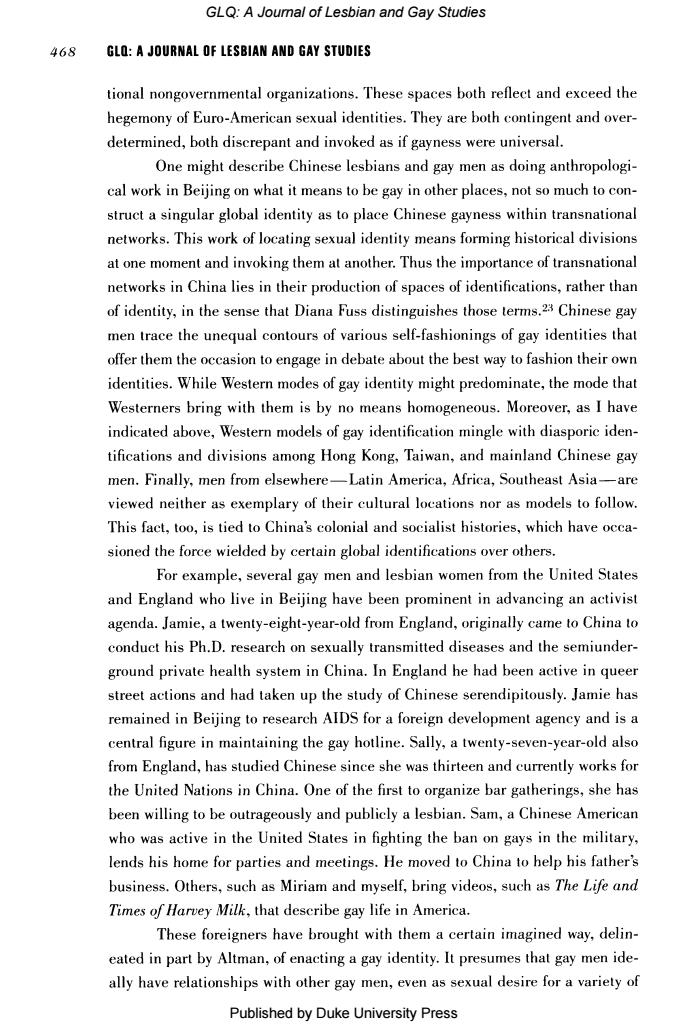正在加载图片...

GLQ:A Joumal of Lesbian and Gay Studies 468 GLQ:A JOURNAL OF LESBIAN AND GAY STUDIES tional nongovernmental organizations.These spaces both reflect and exceed the hegemony of Euro-American sexual identities.They are both contingent and over- determined,both discrepant and invoked as if gayness were universal. One might describe Chinese lesbians and gay men as doing anthropologi- cal work in Beijing on what it means to be gay in other places,not so much to con- struct a singular global identity as to place Chinese gayness within transnational networks.This work of locating sexual identity means forming historical divisions at one moment and invoking them at another.Thus the importance of transnational networks in China lies in their production of spaces of identifications,rather than of identity,in the sense that Diana Fuss distinguishes those terms.23 Chinese gay men trace the unequal contours of various self-fashionings of gay identities that offer them the occasion to engage in debate about the best way to fashion their own identities.While Western modes of gay identity might predominate,the mode that Westerners bring with them is by no means homogeneous.Moreover,as I have indicated above,Western models of gay identification mingle with diasporic iden- tifications and divisions among Hong Kong,Taiwan,and mainland Chinese gay men.Finally,men from elsewhere-Latin America,Africa,Southeast Asia-are viewed neither as exemplary of their cultural locations nor as models to follow. This fact,too,is tied to China's colonial and socialist histories,which have occa- sioned the force wielded by certain global identifications over others. For example,several gay men and lesbian women from the United States and England who live in Beijing have been prominent in advancing an activist agenda.Jamie,a twenty-eight-year-old from England,originally came to China to conduct his Ph.D.research on sexually transmitted diseases and the semiunder- ground private health system in China.In England he had been active in queer street actions and had taken up the study of Chinese serendipitously.Jamie has remained in Beijing to research AIDS for a foreign development agency and is a central figure in maintaining the gay hotline.Sally,a twenty-seven-year-old also from England,has studied Chinese since she was thirteen and currently works for the United Nations in China.One of the first to organize bar gatherings,she has been willing to be outrageously and publicly a lesbian.Sam,a Chinese American who was active in the United States in fighting the ban on gays in the military, lends his home for parties and meetings.He moved to China to help his father's business.Others,such as Miriam and myself,bring videos,such as The Life and Times of Harvey Milk,that describe gay life in America. These foreigners have brought with them a certain imagined way,delin- eated in part by Altman,of enacting a gay identity.It presumes that gay men ide- ally have relationships with other gay men,even as sexual desire for a variety of Published by Duke University Press468 cia: A JOURNAL OF LESBIAN AND GAY STUDIES tional nongovernmental organizations. These spaces both reflect and exceed the hegemony of Euro-American sexual identities. They are both contingent and overdetermined, both discrepant and invoked as if gayness were universal. One might describe Chinese lesbians and gay men as doing anthropological work in Beijing on what it means to be gay in other places, not so much to construct a singular global identity as to place Chinese gayness within transnational networks. This work of locating sexual identity means forming historical divisions at one moment and invoking them at another. Thus the importance of transnational networks in China lies in their production of spaces of identifications, rather than of identity, in the sense that Diana Fuss distinguishes those terms.2:3 Chinese gay men trace the unequal contours of various self-fashionings of gay identities that offer them the occasion to engage in debate about the best way to fashion their own identities. While Western modes of gay identity might predominate, the mode that Westerners bring with them is by no means homogeneous. Moreover, as I have indicated above, Western models of gay identification mingle with diasporic identifications and divisions among Hong Kong, Taiwan, and mainland Chinese gay men. Finally, men from elsewhere-Latin America, Africa, Southeast Asia-are viewed neither as exemplary of their cultural locations nor as models to follow. This fact, too, is tied to China’s colonial and socialist histories, which have occasioned the force wielded by certain global identifications over others. For example, several gay men and lesbian women from the United States and England who live in Beijing have been prominent in advancing an activist agenda. Jamie, a twenty-eight-year-old from England, originally came to China to conduct his Ph.D. research on sexually transmitted diseases and the semiunderground private health system in China. In England he had been active in queer street actions and had taken up the study of Chinese serendipitously. Jamie has remained in Beijing to research AIDS for a foreign development agency and is a central figure in maintaining the gay hotline. Sally, a twenty-seven-year-old also from England, has studied Chinese since she was thirteen and currently works for the United Nations in China. One of the first to organize bar gatherings, she has been willing to be outrageously and publicly a lesbian. Sam, a Chinese American who was active in the United States in fighting the ban on gays in the military, lends his home for parties and meetings. He moved to China to help his father’s business. Others, such as Miriam and myself, bring videos, such as The L$e and Tines ofHarvey MiZk, that describe gay life in America. These foreigners have brought with them a certain imagined way, delineated in part by Altman, of enacting a gay identity. It presumes that gay men ideally have relationships with other gay men, even as sexual desire for a variety of GLQ: A Journal of Lesbian and Gay Studies Published by Duke University Press